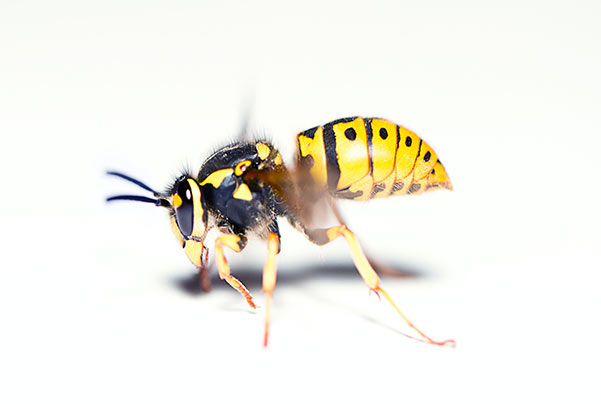How to handle both
With the weather getting warmer, buzzing winged creatures are about to take flight. Bees and wasps are similar but, in fact, very different creatures. However, both can become a nuisance at properties in the Lehigh Valley and surrounding area. Aside from the painful stings they can cause, they may also do damage to your structure depending on what species takes up residence. Let’s learn the difference between wasps and bees and how you can help to protect your property from developing a problem with either.
What are Carpenter Bees
We all know that bees are beneficial for the environment, so eliminating them from your property is not ideal. However, some types of bees can cause big problems. Carpenter bees are a type of bee that can become an issue at homes and businesses. These bees nest within wooden structures which can cause extensive damage. They tunnel into the wood where they build nests. You can easily spot these entry points as they are sometimes as large as a fingertip. They prefer unfinished and unvarnished wood but will chew through most woods like those found on decks, in rafters, or even wood siding.
Do Carpenter Bees Sting?
Male carpenter bees do not sting but do exhibit very aggressive behaviors when disturbed. Female carpenter bees can sting and will do so multiple times when protecting the nest. Those who are allergic to bees can have significant and severe reactions to carpenter bee stings. Having an active carpenter bee infestation at your home can put your structures and your personal safety at risk.
When Are Carpenter Bees Active?
Carpenter bees are most active during early spring and through the summer. On hotter days, they may seek shelter in their nests but they are still very active inside those. They mate during April and May which means those months are when you’ll see the most activity. During July, adult bees die off leaving the activity to the younger generation when it emerges about a month later.
Characteristics of Wasps
While bees and wasps both sting, wasps are quite different otherwise. The major difference between wasps and bees is that wasps are carnivores and feed on insects and arthropods. During the late summer and early fall, they tend to switch to collecting sweet things and carbohydrates as can be seen by aggressive yellow jackets spoiling late summer picnics.
Where Do Wasps Make Their Nests?
Wasps make their nests from paper-like materials including wood particles mixed with their saliva. They only use these nests for one year to reproduce and then die off. That nest is then never used again. Wasps make nests that are exposed but difficult to reach like in spots on the undersides of decks and porches, in corners of windows, or within attics. If a nest becomes threatened, wasps will protect it aggressively, which can result in several nasty stings as wasps can pull the stinger out of a victim and sting again.
When are Wasps Most Active?
Wasps are most active during the day when the weather is warm. You’ll find them incredibly active during the summer months of July, August, and September. Their activity during the summer dips at dusk and overnight when temperatures drop.
How to Prevent Wasps and Carpenter Bees Prevention
You may still find bees and wasps around your property this summer but there are a few things you can do to deter them from nesting on your home or business.
- Remove food sources. Make sure rotten foods and hummingbird feeders are kept away from your structures.
- Make it unappealing. Bees and wasps hate the smell of certain things. People have tried using dryer sheets, mothballs, and cloves to make their homes and businesses unappealing to these winged pests.
- Use plants. A variety of plants can act as repellents for bees and wasps including marigold, mint, basil, and geraniums.
- Check for nests. Be adamant about checking for nests. The moment you spot one, you need to take action.
If you’ve discovered a nest or have already seen bees or wasps buzzing around your property, it’s time to call in the professionals at Seitz Bros and get rid of stinging insects. Sprays and other DIY products can only go so far when it comes to a wasp infestation or a bee infestation. Carpenter bees are notoriously hard to get rid of, so getting a professional evaluation is key.
Contact us today to find out more about our services and to get a quote.
Difference Between Wasps and Bees Pest Control in Pennsylvania & New Jersey
Serving Northeast & Central PA | Lehigh Valley | Pocono Mountains | Western NJ

